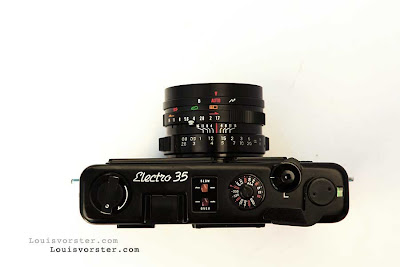A sturdy and well designed leaf shuttered rangefinder with a fast f1.7 lens. The "G" presumedly stand for Gold Mechanica which refer to the gold plated electrical contact points. The GT and GTN was black but Yashica also made satin chrome versions, the GS and GSN. The GT and GTN were identical too each other with the difference that the GTN had a hot shoe.
Obviously a quality camera with a very sharp 45mm Color Yashinon lens it probably won't be my first choice in this class, the Yashica is significantly bigger than my Canonet QL17 III(or the Minolta Hi-Matics), in fact the body is the same size as a small SLR like a Pentax Spotmatic or k1000. While I personally prefer aperture priority to shutter speed priority, the Yashica Electro 35 GT is aperture priority ONLY, whereas the Canonet QL17 III is shutter speed priority AND manual. It also sports no less than three annoying colored lights on the top plate(Red and amber exposure indicators and a green battery check light).
Although they were manufactured in both Japan and Hong Kong, this one was made in Japan. The accessory wide/tele lens kit and auxiliary viewfinder featured in the bottom photograph was made in Hong Kong. It's an iconic and solid rangefinder, with an above average 45mm/f1.7 lens that can be picked up for reasonable(but not cheap) prices on online auctions by anyone interested in film photography. Click on an image to view bigger.
















